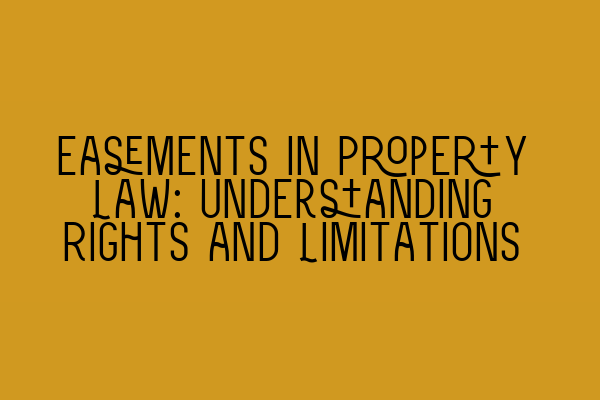Easements in Property Law: Understanding Rights and Limitations
As a property owner or potential buyer, it’s crucial to have a comprehensive understanding of the various legal rights and limitations that may affect your property. One important aspect of property law is easements. In this blog post, we will delve into the concept of easements, exploring what they are, types of easements, and their implications for property owners.
What are Easements?
Easements are legal rights attached to a property that grant specific privileges or impose certain restrictions on the property. Essentially, they allow a non-owner to use or access a portion of another person’s property for a particular purpose. Easements are typically created by a formal agreement between property owners, or they can be imposed by law.
Types of Easements
There are various types of easements, each serving a different purpose. Let’s explore a few common types:
1. Right of Way Easements: Right of way easements provide the holder with the right to travel across another person’s property. These easements are commonly seen in situations where a property is landlocked, meaning it does not have direct access to a public road. In such cases, the owner of the landlocked property may be granted a legal right to pass through a neighboring property to access a public road.
2. Utility Easements: Utility easements allow utility companies, such as water, gas, or electric providers, to access and maintain their infrastructure on a property. This could include installing utility lines or accessing utility meters. These easements ensure that utility companies can provide essential services efficiently.
3. Drainage Easements: Drainage easements are created to manage the flow of water on a property. They grant the right for water to pass through a specific area on a property, often in order to prevent flooding or other forms of water damage. These easements are especially important in areas prone to heavy rainfall or properties situated near bodies of water.
4. Conservation Easements: Conservation easements are designed to protect natural resources and restrict development on a property. In such cases, a property owner may agree to limit the use or alter the potential future use of their land to preserve its environmental, historical, or cultural significance. These easements can be voluntarily entered into with conservation organizations, or they may be imposed by law to protect designated areas.
Understanding the Implications
Having an easement on your property comes with specific implications. It’s crucial to understand these implications as they can affect your property’s value and future development plans. Some key considerations include:
1. Usage and Restrictions: Easements delineate the specific rights granted or restrictions imposed. It’s important to understand the extent and purpose of the easement and how it may impact your use of the property. For example, a right of way easement could limit your ability to build structures or landscapes in the area designated for access.
2. Shared Responsibilities: Easements often come with shared responsibilities for maintenance and repair. If you have a utility easement on your property, you may be responsible for ensuring access and maintaining the infrastructure within the easement area. It’s essential to understand your obligations to avoid potential conflicts or surprises.
3. Property Value: Easements can influence property values. While some easements, such as utility easements, may have a minimal impact, others, like conservation easements, can significantly affect a property’s value. Understanding the implications of an easement on your property is crucial when determining its market worth.
Seeking Professional Advice
When buying or selling a property with an easement or considering creating an easement, it’s advisable to seek the guidance of a professional solicitor specializing in property law. They will help you navigate the legal complexities, ensure that your rights are protected, and provide valuable insights based on their expertise.
At SQE Property Law & Land Law, our team of solicitors can assist you in understanding easements, reviewing relevant documentation, and providing advice tailored to your specific situation. Contact us to speak with one of our experienced solicitors today!
In conclusion, easements are an essential aspect of property law, granting specific rights and imposing limitations on property owners. Understanding the different types of easements and their implications is crucial for making informed decisions and protecting your property rights. If you require legal assistance or advice related to easements, do not hesitate to reach out to SQE Property Law & Land Law for professional guidance.
Related Articles:
– SQE 1 Practice Exam Questions
– SQE 1 Practice Mocks FLK1 FLK2
– SQE 2 Preparation Courses
– SQE 1 Preparation Courses
– SRA SQE Exam Dates
